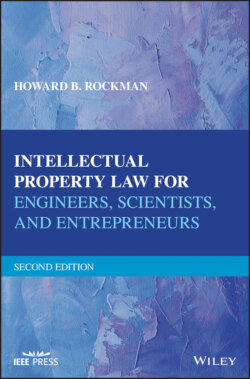Читать книгу Intellectual Property Law for Engineers, Scientists, and Entrepreneurs - Howard B. Rockman - Страница 34
2.4.3 Common Law
ОглавлениеThe U.S. common law was brought over from England by the colonists, and remains the basis of the legal system today in all but one state (Louisiana) of the United States. The common law is used by a court to decide issues between parties when no statute or constitutional law covers the particular legal problem involved. The common law arose with the practice of judges writing their opinions, giving the general principles and reasoning they followed in deciding cases. When the facts were similar in later cases, judges tended to follow the earlier opinions of other judges. These decisions eventually were followed by the courts throughout a particular jurisdiction in cases with similar or near‐similar facts. This gave rise to the term “common law” to describe these judge‐made decisions.
A primary principle of American law involves abiding by previous decisions—a doctrine known in Latin as stare decisis. This is the embodiment of the main feature of the common law wherein the law itself is built on prior case decisions. Thus, a judge uses earlier cases with similar facts as the foundation for that judge’s decision in a particular case. Case law today is reported, and readily available to lawyers, parties, and the judges for precedent purposes. This body of precedential law in the United States forms the body of common law used by both the state and federal governments, except for the state of Louisiana, which still uses the French Civil Code system.
The common law is defined in Kent’s Commentaries (an early legal treatise) as “those principles, usages, and rules of action applicable to the government and security of persons and property which do not rest for their authority upon any express or positive declaration of the will of the Legislature.” This sets forth the principle that the common law is extracted from recorded decisions of courts. As new factual situations arise before the courts, new interpretations of law are made by the courts, and the common law is continuously amplified and modernized.
